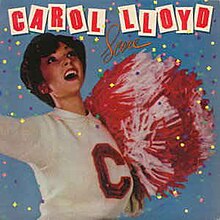
Apartment Life is the second studio album by American band Ivy, released by Atlantic Records on October 6, 1997. After being dropped from Seed Records following the release of Realistic in 1995, the group signed to Atlantic due to connections that Adam Schlesinger had with the record label. In addition to band members Andy Chase and Schlesinger, the album was produced by Lloyd Cole and Peter Nashel. In contrast to their previous releases, such as Lately (1994) and Realistic, Apartment Life is a pop album with varying forms of production consisting of keyboards, brass, and string instruments. Some of the compositions featured on the record were compared to the works of My Bloody Valentine, Pixies, and the Smiths. To promote the album, Ivy embarked on a series of promotional tours across the United States.

"Shake Me, Wake Me " is a song recorded by the American quartet Four Tops for their third studio album, On Top (1966). It was released in February 1966 as a 7" vinyl single through Motown records. It was written and produced by Brian Holland, Lamont Dozier, and Eddie Holland. A gospel rock track, its lyrics detail a relationship that has ended. It has since been regarded as one of Four Tops' most successful singles ever. It charted moderately well in both the United States and Canada, and became the group's fifth consecutive entry to chart within the top five of the Hot R&B/Hip-Hop Songs chart. Four Tops has performed "Shake Me, Wake Me " on various occasions throughout their careers and have included it on several greatest hits albums, including on The Four Tops Greatest Hits (1967) and The Ultimate Collection (1997).
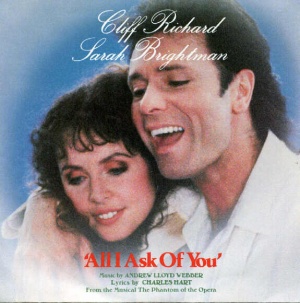
"All I Ask of You" is a song from the 1986 English musical The Phantom of the Opera, between characters Christine Daaé and Raoul, originally played on stage by Sarah Brightman and Steve Barton, respectively. It was written by Andrew Lloyd Webber, Charles Hart and Richard Stilgoe, and solely produced by Lloyd Webber. An operatic pop piece, its lyrics serve as dialogue between the two characters and discuss themes such as commitment and romance. Like Lloyd Webber's song "The Music of the Night", "All I Ask of You" was compared to the music found in Giacomo Puccini's 1910 opera La fanciulla del West.

Barbra Streisand's Greatest Hits Volume 2 is the second greatest hits album recorded by American vocalist Barbra Streisand. It was released on November 15, 1978 by Columbia Records. The album is a compilation consisting of ten commercially successful singles from the singer's releases in the 1970s, with a majority of them being cover songs. It also features a new version of "You Don't Bring Me Flowers", which was released as the collection's only single on October 7, 1978. Originating on Streisand's previous album, Songbird, the new rendition is a duet with Neil Diamond who had also recorded the song for his 1978 album of the same name. The idea for the duet originated from DJ Gary Guthrie who sold the idea to the record label for $5 million.

The Third Album is the third studio album by American actor, singer and songwriter Paul Jabara. The album includes the single releases "Disco Wedding" and "Never Lose Your Sense of Humor". The Third Album, whose title and cover picture paraphrases the Barbra Streisand album of the same name, was released in 1979 on the Casablanca Records label, and again features guest vocalist Donna Summer. In 1979 Jabara also composed the Streisand & Summer duet "No More Tears ".

Lazy Afternoon is the seventeenth studio album recorded by American singer Barbra Streisand. It was released on October 14, 1975 by Columbia Records. Following a mixed critical response to her previous studio album, ButterFly (1974), the singer began working with new musicians for the project. Recorded in April 1975 in Los Angeles, Lazy Afternoon contains pop standards. Producer Rupert Holmes wrote three songs on the album, and co-wrote a fourth, "By the Way", with Streisand. She also included a few cover songs, such as Four Tops' "Shake Me, Wake Me ", Stevie Wonder's "You and I", and Libby Holman's "Moanin' Low".
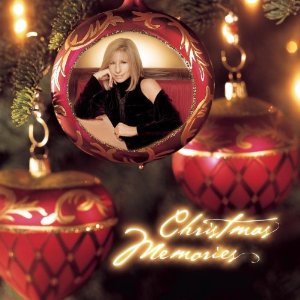
Christmas Memories is the second Christmas album and twenty-ninth studio release by American singer Barbra Streisand. It was released on October 30, 2001, by Columbia. Streisand recorded the album during July, August, and September 2001 in various recording studios throughout California and in North Vancouver. It was executive-produced by Streisand and Jay Landers, while William Ross and David Foster served as additional producers. The album contains several cover versions of various holiday songs. To promote Christmas Memories, Columbia Records released an advance sampler version of the album titled A Voice for All Seasons.

Dos is the title of the second album by Colombian Pop and Vallenato singer Fanny Lu. The album was released in Colombia on December 8, 2008, and in the United States and Puerto Rico the following week. In Colombia, Dos went straight to number one in the album charts in its debut week. The album features the lead single and the official song of the year in Colombia, "Tú No Eres Para Mi".
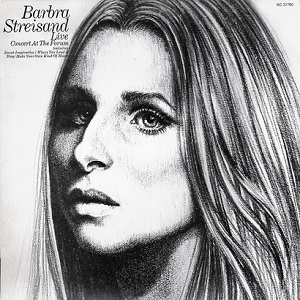
Live Concert at the Forum is the second live album by American singer Barbra Streisand, released physically on October 1, 1972 by Columbia Records. Produced by long-time collaborator Richard Perry, it was recorded at The Forum in Inglewood, part of Greater Los Angeles, on April 15, 1972, during Four for McGovern, a concert held in benefit for George McGovern's 1972 presidential campaign. A CD version of Live Concert at the Forum was released on September 6, 1989.

The Owl and the Pussycat is the soundtrack album to the 1970 American film of the same name. It was released by Columbia Records on December 19, 1970 and features dialogue from the film by Barbra Streisand and George Segal recorded over music performed by American band Blood, Sweat & Tears. The album's five tracks were all written by Buck Henry, produced by Thomas Z. Shepard, and later released by Blood, Sweat & Tears in stripped down instrumental versions on their 2013 compilation album Rare, Rarer & Rarest. An 8-track cartridge edition and cassette tape edition of The Owl and the Pussycat was also distributed, featuring four songs instead of five.

"Didn't We" is a song recorded by Irish singer and actor Richard Harris for his debut studio album, A Tramp Shining (1968). It was written and produced by Jimmy Webb and originally served as the B-side to Harris' 1968 single "MacArthur Park". "Didn't We" was then distributed as the record's single by Dunhill Records, also in 1968. A traditional pop song, Harris sings about his life in the past. Commercially, it charted at lower positions of both the United States and Canada, and in the higher ranks of their Adult Contemporary component charts. Harris featured "Didn't We" on several of his greatest hits albums, including The Richard Harris Collection: His Greatest Performances from 1973. That same year, the song was reissued as a promotional single paired alongside his 1971 single "My Boy".
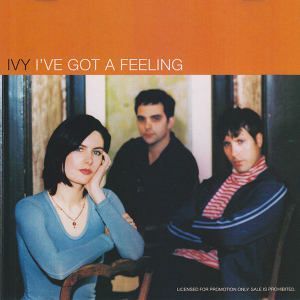
"I've Got a Feeling" is a song by American band Ivy, recorded for their second studio album, Apartment Life (1997). It was released as the record's second single in the United States and Australia on October 7, 1997 and 1998 by Atlantic Records, respectively. The track was written by Dominique Durand, Adam Schlesinger and Andy Chase, with the latter two plus Lloyd Cole and Peter Nashel handling its production. It is a pop song accompanied by light vocals and a horn section, with Durand gently singing about falling in love, over several layers of guitars and relaxed harmonies.

"The Best Thing" is a song by American band Ivy on their second studio album, Apartment Life (1997). Released on September 12, 1997 by Atlantic Records, it was the band's major-label debut single and served as the parent album's lead single. The track was written by Dominique Durand, Adam Schlesinger and Andy Chase, and was produced by the latter two. A pop song, "The Best Thing" is accompanied by several guitars and a keyboard.
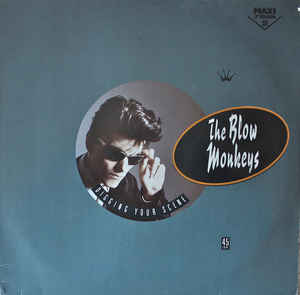
"Digging Your Scene" is a song recorded by English band The Blow Monkeys for their second studio album, Animal Magic (1986). The single was released in February 1986 as the second one from the parent record. It was written by lead singer Dr. Robert, while Howard, Peter Wilson, and Adam Moesley produced it. Musically a pop, soul, and jazz song, "Digging Your Scene" discusses the hatred and disgust that is associated with individuals who have HIV and AIDS. Several media professionals felt the song's subject matter would be the subject of criticism.

"Guava Jelly" is a song recorded by the Jamaican group Bob Marley and the Wailers. It was released as a 7" vinyl single through Tuff Gong and Green Door Records. It was issued commercially with B-side track "Redder Then Red", which was misspelled on its initial printing, in 1971. It was written and produced by Marley and features uncredited lyrical contributions from Bunny Livingston. A reggae composition like the majority of Marley's works, "Guava Jelly" contains a rocksteady and island-like production with lyrics loosely based around sexual intercourse. His use of the term "guava jelly" was likely referring to a specific type of sexual lubricant. It was favorably viewed by several reviewers, with many of them finding the composition to be sexual and about love. The group placed "Guava Jelly" on several compilation albums, including Africa Unite: The Singles Collection in 2005, and Owen Gray and Herbie Mann created their own versions in 1974 and 1975, respectively.

"Jubilation" is a song recorded by Canadian singer-songwriter Paul Anka for his 1972 studio album of the same name. Anka wrote the song with Johnny Harris, who also produced the track. It was released in 1972 as a 7" single by Buddah Records. A gospel song, the lyrics of "Jubilation" find the protagonist preaching about religious themes. Making a moderate commercial impact, it appeared on the record charts in both Canada and the United States. It has since been included on several of Anka's greatest hits albums and covered by The Edwin Hawkins Singers in 1973.
Carol Lloyd is an American singer from Philadelphia, Pennsylvania. She is known for the release of her two solo albums: Score in 1979 and Love Carol in 1983.

Love Carol is the second and final studio album released by American singer Carol Lloyd, released in 1983 by Philly World Records.

"Downtown" is a song by English singer, songwriter and musician Lloyd Cole, released in 1990 as the third and final single from his self-titled studio album. The song was written by Cole and Blair Cowan, and produced by Cole, Fred Maher and Paul Hardiman. It failed to enter the UK Singles Chart but reached number 5 on the US Billboard Modern Rock Tracks chart. The song was included in the soundtrack of the 1990 American psychological thriller film Bad Influence.

"She's a Girl and I'm a Man" is a song by English singer, songwriter and musician Lloyd Cole, released in 1991 as the lead single from his second studio album Don't Get Weird on Me Babe. The song was written by Cole and Robert Quine, and produced by Cole, Fred Maher and Paul Hardiman. It peaked at number 55 in the UK Singles Chart and remained in the top 75 for two weeks. In the US, it reached number 7 on the Billboard Modern Rock Tracks chart.
